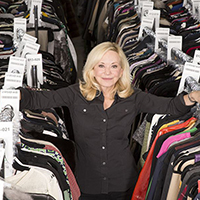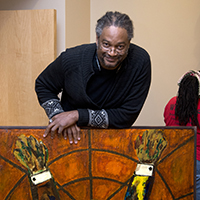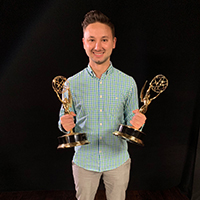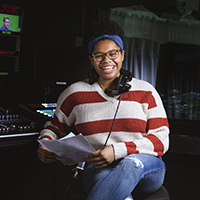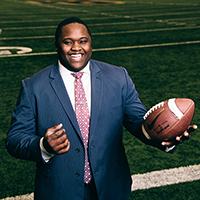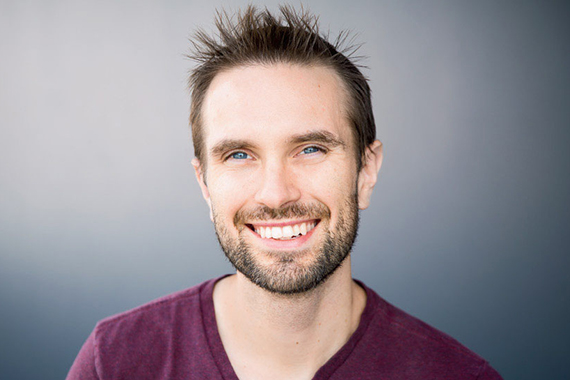 Karl Stelter's first short feature film, The Long Goodbye, examines family dynamics from multiple perspectives. (Photo provided)
Karl Stelter's first short feature film, The Long Goodbye, examines family dynamics from multiple perspectives. (Photo provided)
Behind the Lens
Econ alum brings Karl Stelter his talents to filmmaking
Karl Stelter didn’t want to attend Purdue University. In fact, he wasn’t keen on attending any college. His parents insisted, however, so the Lake Forest, Illinois, native followed in his father’s footsteps to Purdue and the College of Engineering.
“I quickly realized engineering just wasn’t a good fit for me,” Stelter says. “I was looking for something that felt more like a well-rounded major that could be cross applied to other things, so I changed to economics and transferred to the Krannert School.”
Fast-forward four years and Stelter (BS ECON ’08) found himself in a similar quandary. “I still hadn’t figured out what I wanted to do, so I ended up working for a couple years in the family business.” The company, Master Control Systems, was founded by Stelter’s grandfather in 1965 and today is a leading manufacturer of fire pump controllers for sprinkler systems across the U.S.
“It was effectively an internship that allowed me to see what my dad did, travel with him to trade shows and work the booth, and manage special projects,” he says.
Among those special projects was a video tutorial featuring the company’s line of products, which sparked a passion for storytelling and filmmaking that took Stelter by surprise. “I had never seriously thought about it as a career until then, but the project helped me discover that there was a way to make films and get paid for it without necessarily directing the next Oscar winner,” he says.
Stelter, who would have been the third-generation of his family to run the business, initially feared disappointing his father. As it turned out, his reaction was overwhelmingly supportive. “He embraced my dream as if it were his own and gave me the confidence to pursue it,” he says.
Even with his family’s support, Stelter faced an uphill battle. He bought a set of basic film equipment, moved to Los Angeles in 2010, formed Karl Stelter Studios in 2012, and devoted himself full-time to his craft.
"At heart, I wanted to tell stories that could deeply affect people in a positive way, but in the meantime, I planned to take any job related to filmmaking I could get," he says. “However, after two years of honing my craft and scraping by on odd jobs, I took a step back to ask a hard question. Why were other small production studios finding more success?
“That’s when I realized that balancing practical projects like company training videos with more creative projects would help me survive in the industry until I was more established. I needed to focus on growing myself both as a craftsman and a businessman.”
Stelter soon began finding new projects to supplement his creative aspirations, doing “every sort of video you can imagine, from weddings to corporate profiles.” He also produced and directed a trilogy of branding films for his hometown of Lake Forest, and is currently completing a three-part documentary series about autism commissioned by a nonprofit in North Carolina.
“Every project starts with you onboarding the client and setting expectations, which is the first thing that you need to do in business when you're working with someone,” Stelter says. “What do they expect from you? What do you expect of them? That sets the ground rules on every project, whether it's a creative one or a corporate one.”
Likewise, Stelter says each film is like its own company. “Your goal with the film is to create a unified vision, so you hire different department heads — cinematographers, editors, composers, etc. — and give them very specific instructions,” he says. “Everyone needs to be on the same page. Otherwise, the composer might come back with a song that doesn’t match the tone of the film.”
Along the way, Stelter also completed his first short feature film, The Long Goodbye, which delivers a powerful message that comes from his own experience.
“I wrote this film while watching my Grandpa slowly losing his health over the years, eventually watching him take his last breath,” Stelter says. “And during that time, I desperately wished that I had gotten to know him more while he was still young and vibrant, telling stories and jokes from my childhood memories.
“But there is another, often neglected side of this story: the other person has to open up, too. Channeling that into the film, my hope is to bridge the generational gap by providing an intimate look at aging and relationships from both the grandparents' and grandkids' perspective. And more than anything, my hope is that this film can spark a conversation and connection with your loved ones before it’s too late.”
Today, Stelter continues balancing commercials and branded content with his very personal narrative work — and sets an example that artists can also be businesspeople. “It’s not an ‘either-or’ proposition,” he says. “My story shows that you can bring business to art without losing your soul.”

